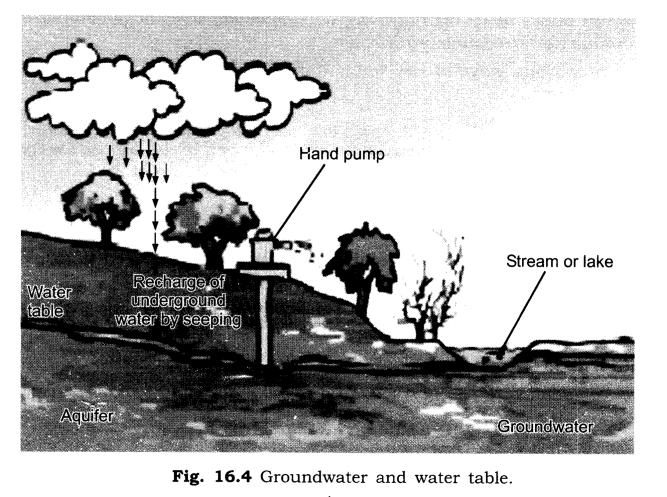NCERT Solutions for Class 7 Science Chapter 16 Water A Precious Resource
Topics and Sub Topics in Class 7 Science Chapter 16 Water A Precious Resource:
| Section Name | Topic Name |
| 16 | Water: a precious resource |
| 16.1 | How much water is available |
| 16.2 | Forms of water |
| 16.3 | Groundwater as an important source of water |
| 16.4 | Depletion of water table |
| 16.5 | Distribution of water |
| 16.6 | Water management |
| 16.7 | What role you an play |
| 16.8 | Effect of water scarcity on plants |
Q.1. Mark ‘T’ if the statement is true and ‘F’ if it is false:
(a) The freshwater stored in the ground is much more than that present in the rivers and lakes of the world. (T/F)
(b) Water shortage is a problem faced only by people living in rural areas. (T/F)
(c) Water from rivers is the only source for irrigation in the fields. (T/F)
(d) Rain is the ultimate source of water. (T/F)
Ans. (a) T (b) F (c) F (d) T
Q.2. Explain how groundwater is recharged.
Ans
. The groundwater gets recharged through the process of infiltration. Infiltration means seeping of water from rivers and lakes into the empty spaces and cracks deep below the ground.
Q.3.There are ten tubewells in a lane of fifty houses. What could be the long-term impact on the water table?
Ans
.The effect on the water table depends on the replenishment of underground water. Only five families will share a tubewell, the water used for daily domestic purposes will not effect the water table. But if there is shortage of rains, the water used by the family will not replenished and water table will fall down.
Q.4.You have been asked to maintain a garden. How will you minimise the use of water? „
Ans
.To minimise the wastage of water we will use the drip irrigation which throws the water at the base of plants. We will check the leakages in the water pipes and arrange small pits for rainwater harvesting. The collected rainwater will be used later.
Q.5.Explain the factors responsible for the depletion of water table.
Ans
.Various factors responsible for the depletion of water table are:
(i) Increased population: Demand of water has been increased by the increased population. As the number of humans increase, the consumption of water also increases.
(ii) Increasing industries: All industries need water. As the number of human population increase, the number of industries are also increased which definitely increases the consumption of water.
(iii) Lack of water conservation techniques: Main source of water on earth and for the underground water is rain. The water of the rain, if conserved can increase the ground water level. But this is not done due to lack of water conservative techniques.
(iv) Agricultural activities: India is a country which depends on agriculture. The land used for cultivation has increased. So, the consumption of water for agriculture has increased. Irregular rainfall has increased the consumption of groundwater. This has increased the depletion of groundwater.
Q.6.Fill in the blanks with the appropriate answers: .
(a) People obtain groundwater through and .
(b) Three forms of water are solid, and .
(c) The water bearing layer of the earth is .
(d) The process of water seepage into the ground is called .
Ans
.(a) wells, hand pumps
(b) liquid, gas
(c) aquifer
(d) infiltration
Q.7.Which one of the following is not responsible for water shortage?
(i) Rapid growth of industries
(ii) Increasing population
(iii) Heavy rainfall
(iv) Mismanagement of water resources
Ans
.(iii) heavy rainfall
Q.8.Choose the correct option. The total water
(i) in the lakes and rivers of the world remains constant.
(ii) under the ground remains constant.
(iii) in the seas’and oceans of the world remains constant.
(iv) of the world remains constant.
Ans
.(iv) of the world remains constant.
Q.9.Make a sketch shoyving groundwater and water table. Label it.
Ans

NCERT Solutions for Class 7 Science – All Chapters
- Chapter 1 Nutrition in Plants
- Chapter 2 Nutrition in Animals
- Chapter 3 Fibre to Fabric
- Chapter 4 Heat
- Chapter 5 Acids, Bases and Salts
- Chapter 6 Physical and Chemical Changes
- Chapter 7 Weather, Climate and Adaptations of Animals to Climate
- Chapter 8 Winds, Storms and Cyclones
- Chapter 9 Soil
- Chapter 10 Respiration in Organisms
- Chapter 11 Transportation in Animals and Plants
- Chapter 12 Reproduction in Plants
- Chapter 13 Motion and Time
- Chapter 14 Electric Current and Its Effects
- Chapter 15 Light
- Chapter 16 Water: A Precious Resource
- Chapter 17 Forests: Our Lifeline
- Chapter 18 Wastewater Story